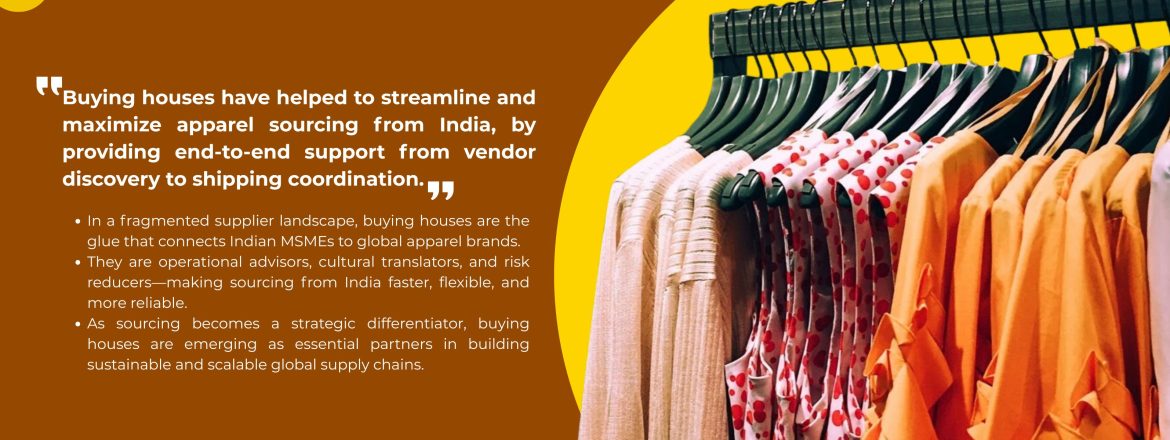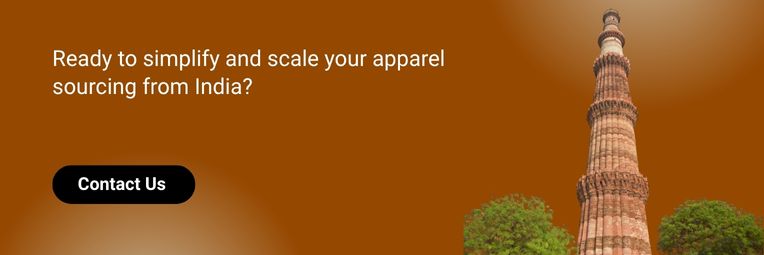Why Buying Houses Are the Best Partners for Apparel Sourcing from India
Apparel Sourcing from India: A Strategic Advantage for Global Buyers
India’s apparel industry, characterized by craftsmanship, scalability, and cost, remains an important piece of the global textile supply chain. Sourcing apparel from India has transformed in the past ten years, from a purely cost-based sourcing decision to a sophisticated decision based upon production quality, compliance, and ethical manufacturing. Sourcing can still be a difficult process to navigate through India’s expansive supplier landscape, especially for global apparel brands that do not understand the regional dynamics of India and its regulatory requirements.
From out of this context, buying houses emerge, as much underappreciated players in the ever complex sourcing ecosystem. For many global brands, buying houses have helped to streamline and maximize apparel sourcing from India, by providing end-to-end support from vendor discovery, to quality management, schedule management and shipping coordination.
In a fragmented landscape, where thousands of micro, small and medium enterprises (MSMEs) are functioning on their own, buying houses are the glue that connects Indian supply to potential global customers.
Clothing Supplier Companies in India: Unlocking Their True Potential
There are millions of clothing supplier companies in India, with a wide range of size, specialization, and production levels. This diversity offers flexibility to day-to-day buying, but it may also create obstacles for overseas buyers who are uncertain about choosing the right partner. Language barriers, problems with compliance, suppliers adopting different standards, and mechanical differences among manufacturers can derail even the most organized sourcing plans.
Buying houses, or agents play an important role here, creating short and medium lists based on client expectations for geography, type of product, order fill, and lead times. Some buying houses offer their clients, local knowledge but the more established buying houses / agents offer more relationships with factories, often having negotiated better terms, and working with them to monitor supplier performance, quality of product, social standards, and environmental standards
This means buying houses/agents are easier able to find the perfect supplier for a specific (new) product, which allows brands to operate faster, with greater flexibility, and mitigate risks from dependency on seeing too many products through a single vendor.

Vendor Sourcing: Why Outsourcing It Makes Business Sense
Vendor sourcing is more than just finding factories. It requires sourcing due diligence, negotiation, compliance auditing, capacity planning, and contingency mapping. Many global fashion brands do this work in-house or with their own teams. All too often, sourcing is defined as a complex and time-consuming process that can sap resources and divert crucial management attention from core business activities when dealing with new regions and markets.
Buying houses allow companies to transfer these high-friction activities to vendor sourcing experts in the complex world of manufacturing in India. The buying houses already have vendor pools established by geography, product specialty, and compliance level, so they can significantly reduce the startup onboarding time.
Buying houses also conduct regular vendor evaluations and performance audits to ensure that the factories remain competitive, responsive and compliant with evolving buyer standards. This is not only a helpful service to protect product quality while increasing stability in the supply chain long term but ensures continuity in processes.
Why Buying Houses Excel as the Best Sourcing Partner in India
It’s not surprising that many international brands now regard buying houses as the leading sourcing partner in India. Buying houses are full-service alternatives to third-party procurement consultants who only provide project-based support; their relationships span seasons, product lines, and evolving business situations. Buying houses provide support that transcends placing orders; they are operational advisors, cultural translators, and risk reducers. They can also offer proven systems for production planning, documentation, and quality control—processes that are increasingly important in today’s on demand retail environment. Whether you are sourcing fast fashion, fundamentals, or other ethically made offerings, a buying house has the localised industry knowledge with a truly global approach. In this respect, buying houses change the exporter-importer relationship to be a sourcing model that is collaborative, data-driven, and based on trust and accountability.
Streamlining Vendor Management and Compliance
In a diverse country like India, while vendor management can seem like a straight-forward oversight of vendor contracts, it has the potential for generation labour rules, customs, textile clusters, and extensive regulatory components. Of course, buying houses know how to navigate this complexity by centralizing the tracking and monitoring of production status and quality and corrective actions. Buying houses also streamline vendor management to help mitigate expensive mistakes like delays due to non-compliance issues, production slowdowns, or unplanned raw material needs. Using the buying houses centralized tracking, when available, means that buyers should get live status reports to increase transparency and improve the speed of major supply chains. Ultimately, buying houses act as a key operational partner in meeting tight timelines by successfully overcoming potential unexpected disruptions or delays and maintaining brand reputation in a market of heightened competition.
The Value of a Products Sourcing Company with Category Depth
When buying houses operate as a products sourcing company with deep specialisation in apparel, the advantages multiply. They can advise on fabric selection, monitor seasonal fashion trends, assist with lab testing, and ensure that design-to-shelf timelines are met. Their ability to synchronise multiple suppliers across the value chain—from fabric mills to accessory providers—makes the sourcing process seamless and scalable.
This layered support model is particularly beneficial for fashion brands experimenting with capsule collections, private labels, or sustainability-driven launches, where speed and execution are as critical as price and quality.
Final Thoughts
India is undoubtedly an attractive sourcing location, but for buyers to take advantage of India’s full potential, they must operate within a multi-faceted and dynamic supplier landscape. Buying houses create the perfect link between global expectations and local execution. If the intent is to source strategically from the vendor side, utilize the relationships created with some of the leading clothing supplier companies in India or consolidate apparel sourcing from India, then a capable buying house will be of tremendous value.
As the supply chain continues to shift from being a back-office function to a strategic point of differentiation, buying houses in India are showing their value as essential sourcing partners not only as facilitators, but as enable and support in building sustainable, reliable, and source-able global apparel sourcing for the future.









